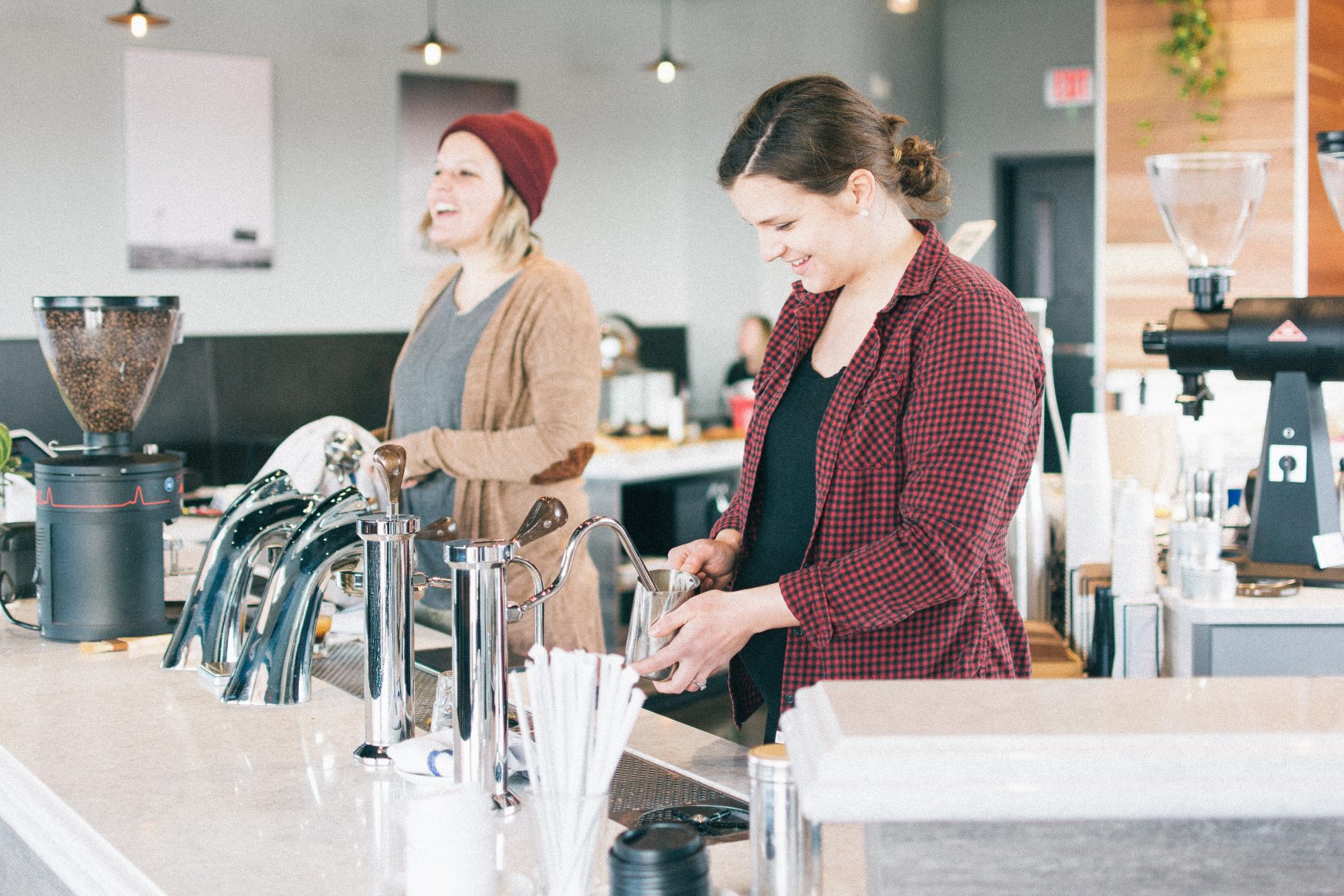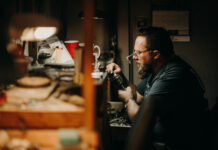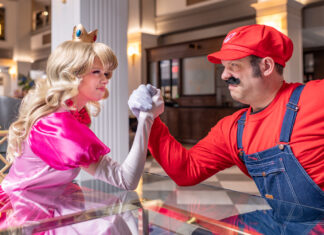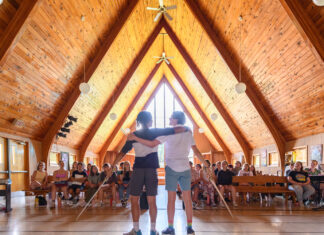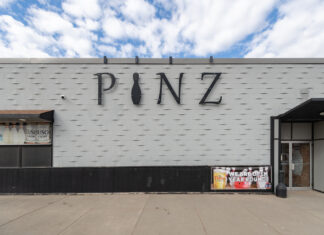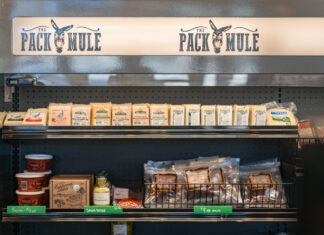When planning a trip, there are always must-see locales, like museums, parks, and famous landmarks. A lot of those stops, though, are in between taking in heavy amounts of local cuisine and drinks. Specialty coffee shops are a prime example of soaking in the scene, and South Dakota has definitely seen a rise in options throughout the state.

Owner/partner of Pure Bean in Rapid City, Mark Royalty, says people find comfort in local coffee shops in different cities, and that’s why they flock to get a taste of their take on the familiar product.

“Coffee is very much a relational product, and there is so much room for expression in the coffee production side of things,” said Royalty. “You can actually have a lot of different shops all doing their own brand and have a vastly different experience with the coffee from shop to shop.”

CEO of Coffea Roasterie & Espresso Bar in Sioux Falls, Bryan Kegley, agrees, noting that local coffee shops can give a preview into the community for outsiders. “Traveling to different towns, you really get a very good microcosm of what that city is when you go to local shops,” he said.
After dropping by several businesses and trying bags (and K-Cups) of local coffee, one thing is certain – the product speaks for the passion behind it.
ROASTING
Before the shop doors open and the patrons are ever lined up, the dream typically begins as a hobby or a side project at home. For Royalty and partner Nick Reid, their project outgrew them faster than anticipated.

“We started in my garage going on five years ago now, and so we outgrew the garage in about 11 months,” he said. “We moved to our first suite here in the [Fairmount] Creamery Building, and we were there for two years before we built the coffeehouse, and we built the coffeehouse last April.”

Pure Bean grew even more, and has taken over the space that was once a salon in the same building for roasting, baking, and wholesale production. “We doubled our footprint on our wholesale side,” described Royalty, who mentioned they’re roasting around 1,500 pounds of coffee a week.

Kegley’s story was a bit different, home roasting for fun, and realized he, himself, had room to grow when he came on with Coffea.

“I was getting into roasting, started at Coffea, and soon realized I knew absolutely nothing about coffee and soon fell into the rabbit hole of specialty coffee,” he laughed.

Coffea roasted in their original Louise Avenue location, but has since moved to a facility in Harrisburg with a head roaster there full time.

Jacob Limmer, owner of Cottonwood Coffee in Brookings, purchased roasted coffee from a company out of Kansas until 2012, when he took the leap to roast his own. The reason? He wants to give the coffee world a taste of home.
“I want to manifest our Midwestern values in the bigger coffee scene regionally and nationally,” he said.

To do so, the company has started to transition the roasting operation into a stand-alone wholesale business, and are remodeling approximately 3,000 square feet behind their downtown location.
Cottonwood and Coffea use a drum roaster, which is the most common type. Pure Bean uses three air roasters, though one is with the South Dakota School of Mines and Technology to modify it to increase capacity. They each can roast six pounds, roasting 12 pounds at a time. Royalty says air roasters have changed tremendously over the years, and that seasoned roasters would be surprised at the versatility and control of the process of current machines.

“We can intuitively change our roast profile on the fly if we need to, and have instant control of the parameters of the process,” he described.
This, to Royalty, is what makes it a craft experience.
“You can see the roast while it’s roasting. You can smell it, you can hear it, and that’s where the artisan aspect of it comes in, because you can get all of your senses involved with the product. That’s why we love this,” he said.
THE GODFATHERS OF SPECIALTY COFFEE
While specialty coffee shops are starting to pop up throughout the state, one has been around for over 15 years, roasting quality drinks and giving Sioux Falls locals a place to come together – Black Sheep Coffee House. Like many, manager and coffee roaster Matthew Pitts has fond memories of the location on West 11th Street. “I remember coming here in high school when it was Z Coffeehouse, and then Great Plains Coffee. When it became Black Sheep Coffee and was in that transition period, I started working here,” he said.

As one of the first coffee roasters in the area, Pitts has seen the industry transform over the years. “A lot has changed over the years in terms of preparation, and the term specialty coffee really kind of stems from those roots and has really adapted,” he said. “There’s more emphasis on presentation and pairing with other products, whether that’s food, beer, or wine.”

One of his favorite things he has noticed is the close-knit scene in the coffee world. Pitts said, “This really opened my world to what coffee can be.” He also mentioned bittersweet news, explaining the strip mall had been purchased and that they will be relocating. The last day Black Sheep will be open in its original location will be March 28. Updates will be coming of the new space on social media and their website.

THE SOURCE
One of the most special aspects of specialty coffee is the dedication and mission to source, brew, and serve “coffee without compromise.” Many businesses are 100 percent fair trade, meaning they are creating partnerships with farmers across the world based on dialogue, transparency, and respect, creating long-term sustainability.
When we chatted with Kegley, he had just returned from a trip to Guatemala to meet with a farmer. “Our closest relationships are in Guatemala and Colombia,” he said. “Our longest is four years that we’ve bought his coffee.”

Royalty says all of their coffee has a story behind them.
“We want our brand to be very missional. A lot of the things we do are really unique to the region, like our Thai coffee, for instance. We started a non-profit importer a year ago to be able to import this coffee so that we can then send money back to prevent human trafficking in Thailand,” he continued, ‘We have another coffee, on the other side, that is an all women’s-produced coffee that we got to meet the producer in Colombia in September on a sourcing trip.”

Sourcing is a huge focus behind each of their brands. Limmer says they are invested in the supply train transparency and improving conditions where coffee is grown and harvested. The shorter the supply chain, the more he feels their money can do for improving quality of coffee and the lives of the coffee growers. With this mission and goal, the more the merrier, says Limmer.
“Recently, smaller roasters have started banding together, traveling to various coffee producing countries and buying cooperatively. That is something we are currently pursuing as well,” he said.

One question came up with Royalty that really leads to the next topic in craft coffee: “How do we connect that communication between farmer and consumer?”
BREWING UP DISTRIBUTION
Along with selling coffee in the traditional sense, some companies are expanding their product line. Ben Duenwald, owner of Flyboy Donuts in Sioux Falls, started packaging their coffee in K-Cups.

“A lot of times people love good coffee, but they want quick coffee,” he said. “I knew if I wanted to be in the game, I had to start offering K-Cups. When I was researching, I found 55 percent of all households have a Keurig.”

Pure Bean in Rapid City expanded with cold brews, and recently signed a distribution contract with Quality Brands. “We’re going to be taking our bottled cold brew across the state,” said Royalty. “It’s going to be cool.”
CREATING CONVERSATION
Though specialty coffee is on the rise, there is definitely room to grow in terms of understanding through the consumer’s eyes. Kegley says some customers don’t quite grasp what they’re trying to do, and that a portion understand coffee “mediated through Starbucks” in regards to consistency and efficiency.
“That means a certain style of roasting that’s very typical to how Starbucks coffee tastes, and their menu is coffee as an ingredient. So you have a designed drink that has milk, lots of flavor, and coffee, and that’s what the drink is,” continued Kegley, “whereas, for us, instead of trying to tailor drinks by flavors and syrups and stuff like that, we want to tailor drinks by interacting with farmers and understanding how coffee is actually grown as an agricultural product, and then form and shape that to that roasting process to have our product as ideally just coffee.”

Since they opened their first of three locations eight years ago (they celebrate their anniversary this month), the company has noticed many changes in how consumers utilize the menu. At the beginning, they were using their local milk and in-house syrups to create familiar “Starbucks” drinks, like caramel lattes and white chocolate mochas.

“Over time, as we started interacting more and flushing out what you’re really trying to do, people have started to gravitate more towards drinking espresso and drinking just coffee,” said Kegley. “That’s really what we like. We definitely like making good drinks with good ingredients, there’s a market for that and those people should get coffee too, but our passion is coffee.”
The owners of Pure Bean saw the need for a quality coffee shop as well when they started their business plan, and wanted to act on it fast, as they knew the timing was right.

“In other cities and bigger cities, you have a vibrant coffee culture, and you’ll have multiple independent coffee shops roasting and brewing their own brand and their own ideology of expressing that brand, and here there really wasn’t anything,” said Royalty. “So we took that very seriously as an opportunity for us to be able to help influence that culture. It’s been pretty amazing. Now there are shops popping up, and we think that is so cool.”
Royalty, a former carpenter, and his team hand-built the shop in only five weeks. One intentional element when they set up the bar was where they placed the espresso machine – underneath the counter.

He explained, “That’s different compared to conventional setups, where you have this huge espresso machine, and the barista is back there and you can see them from the nose up. We specifically designed everything up front to put our baristas almost in a fish bowl to where we can invite people into the process and ask questions.”
Customers have been busy asking questions and have become more adventurous, like frequently ordering The Cardigan, which is made with in-house cardamom and vanilla, and is topped with fresh, black sea salt.
“It never gets too wild, but they have to really dial me back, because I can just go,” said Royalty. “I haven’t been able to put bacon in a latte yet. We’re getting people to really trust our recommendations, then we can branch out and do really different things.”

Limmer also wanted people to feel welcome in both of his Brookings locations. “High quality coffee can often be a daunting experience for ‘average’ consumers. I want to dismantle that mystery and get great coffee in the hands of regular people that see the value in paying a fair price for a high quality product,” he said.
SoDak Coffee Roasters Expo
Drink coffee with the roasters themselves, and learn about the region’s growing coffee scene at The Bakery in Sioux Falls March 25 from 3-5 p.m. Enjoy samples from eight to 10 companies and ask them questions. Free admission. For more info, visit thebakerysf.com.
The Community
Whether you’re traveling or trying out new locations in the area, coffee shops are undoubtedly a great way to meet people and learn about the area surrounding it.
“Coffee shops are the social hub for the community. If you want to get a feel for a town, find their main coffee shop,” said Limmer. “I love the Italian culture’s approach to coffee. They consume small quantities (usually espresso) several times per day. This breaks up the day and allows people to socialize with each other. That communal aspect is critical to our success.”

And as each business expands and new ones open their doors and ship out products, other owners welcome them with open arms.
Royalty said, “For us it is about community. We believe that the rising tide raises all the vessels. We want to be part of influencing something positive in the community.”
TASTE THE DIFFERENCE
605 compiled a small list of just some of the businesses to get your (quality) caffeine fix:
Alternative Fuel
Rapid City, S.D.
alternativefuelcoffeehouse.com

Black Sheep Coffee
Sioux Falls, S.D.
blacksheepcoffee.com

Coffea Roasterie & Espresso Bar
Sioux Falls, S.D.
coffearoasterie.com
Cottonwood Coffee
Brookings, S.D.
cottonwoodcoffee.com

Dark Canyon Coffee Company
Rapid City, S.D.
darkcanyon-coffee.com
Dixon Coffee Company
Rapid City, S.D.
dixoncoffeecompany.com
Essence Coffee Roasters
Iroquois, S.D.
essencecoffeeroasters.com

Essence of Coffee
Rapid City, S.D.
essenceofcoffee.com

Flyboy Donuts
Sioux Falls, S.D.
flyboydonuts.com
Harriet & Oak
Rapid City, S.D.
facebook.com/harrietandoak

Pure Bean
Rapid City, S.D.
purebeanroasters.com

Sturgis Coffee Company
Sturgis, S.D.
sturgiscoffeecompany.com

The Breaks Coffee Roasting Co.
Sioux Falls, S.D.
thebreakscoffeeroasting.com


